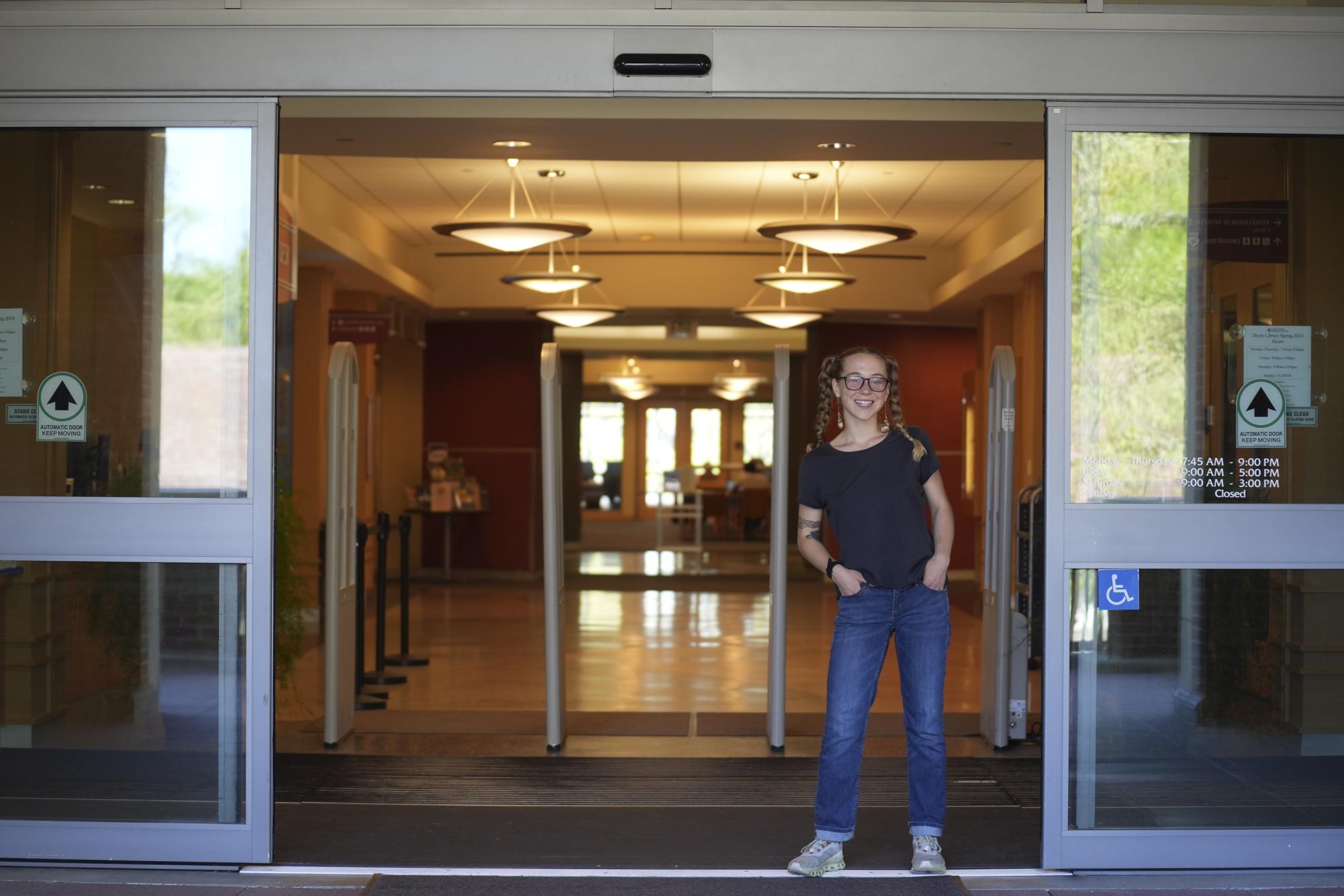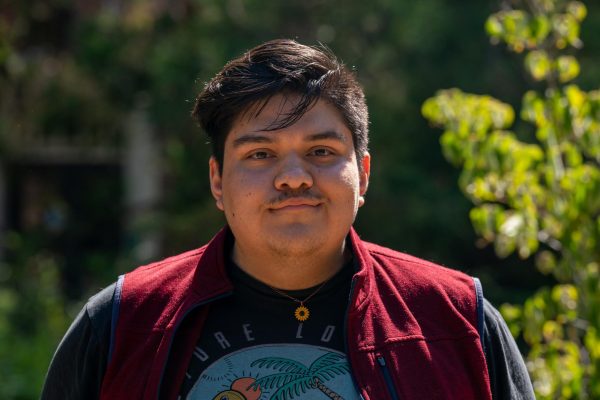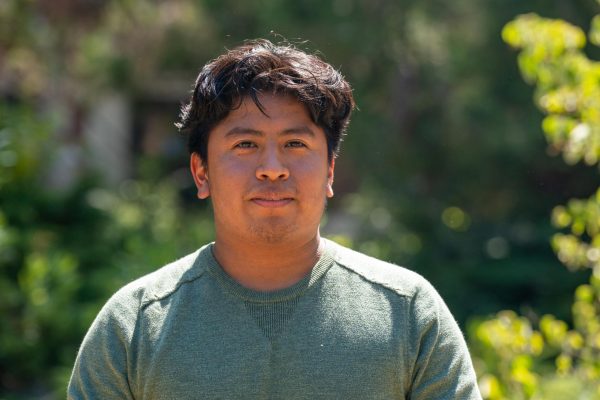Hungry? Need therapy? Does your vehicle need repairs? Need affordable childcare, dental care, reproductive healthcare and more?
You may resort to grossly expensive options when fulfilling these needs, but does Santa Rosa Junior College come to mind? Well it should, because SRJC is more than just another run-of-the-mill college to take classes at. Believe it or not, SRJC features a cornucopia of services for Bear Cubs to meet the difficulties of day-to-day life directly, and at free or reduced prices.
Here are just some of the ways SRJC’s services can help you meet your needs.
Free food
According to the California Student Aid Commission, 66% of students who applied for financial aid from 2022 to 2023 experienced food insecurity, a 27% increase from four years prior. And while this surge is most likely a holdover from the COVID-19 pandemic, the scourge of food insecurity nonetheless continues to persist for a majority of students. Luckily, resources to alleviate these issues are plentiful and often just a click away.
One such resource is the Bailey Field pantry kiosk. Sandwiched between the eponymous football field and Garcia Hall on the Santa Rosa campus, this small building stores a pantry packed with free food.
The process is simple: Scan the displayed QR code with your phone, go to a Google form where you input your name and student information. Subsequently, you are able to select food available within the pantry and then receive the food a few minutes later.
SRJC’s Shone Farm and the Redwood Empire Food Bank provide food for the pantry, as well as the Student Resource Center, open from 10 a.m. to 4 p.m. Tuesdays and Thursdays, and 10 a.m. to 6 p.m. Wednesdays. The white building adorned with a cobalt blue awning may look inconspicuous enough, but the student workers within have overseen nearly 4,000 transactions this semester, roughly 100 to 150 a day, according to Will Schettler, one such worker.
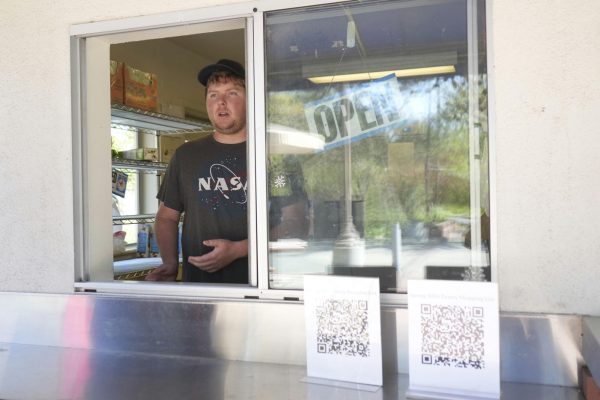
“It’s a really good resource for students to have,” Schettler said. “If you’re just stopping by and if you want, like, a coconut water, some beef jerky or stuff like that, or sometimes on the rare occasion where we have three tables full of produce and eggs — no matter what kind of stuff, it’s definitely a plus to have this kind of resource.”
The Petaluma campus boasts an equally notable amount of assistance. Inside the Welcome & Connect Center are a plethora of resources, including free food, showers, laundry, toothpaste, towels, soap, shampoo and lotion. The food pantry here is open 8 a.m. to 5 p.m. Mondays through Thursdays, and 8 a.m. to noon Fridays. The Feed The Bears meal voucher, another resource, grants students who fill out a basic needs application up to four $15 vouchers to buy food and beverages at the Petaluma campus bookstore.
In addition, the Petaluma campus — in partnership with the Redwood Empire Food Bank — has hosted free farmer’s markets this semester from 11:30 a.m. to 1:30 p.m. the first Tuesday of each month under the outdoor canopy between buildings 400 and 500.
Similarly to the Santa Rosa campus QR code, students must fill out a form to obtain the Petaluma services. More information regarding these resources is available at resources.santarosa.edu.
Free therapy
All enrolled SRJC students are eligible for free in-person or virtual therapy.
“If you have some hesitation about therapy, try going once or twice, or maybe only sharing some information,” encourages Dr. Bert Epstein, manager of SRJC Student Health Services and Mental Health Programs. “That can help people feel more comfortable. And then you decide if you want more sessions or want to share more.”
In 2022, 23% of Americans sought counseling, compared to only 13% of Americans in 2004, according to Gallup polling. SRJC students have followed this growing national trend. Available at SRJC since 1992, counseling has been a source of comfort for many students and despite a downturn during the pandemic, 600 students annually have turned to counseling in recent years, according to Epstein.
He noted that the Petaluma campus only offers in-person therapy Wednesdays, while the Santa Rosa campus offers them Mondays through Fridays because of the predominance of students there. “In the future we are looking to expand services to SRJC Roseland. And students at all campuses can make use of our remote services,” Epstein said.
With therapists seeing students on average for six sessions per academic year, the types of counseling services offered vary. “Students come in for a variety of issues; most frequent are stress, anxiety, depression and relationship issues of all types,” Epstein said, noting that funding from the county and state has resulted in additional psychiatric services, after-hours services, social workers and additional staff at SRJC. “We are very familiar with community resources, and assist students if they tell us right away they want long-term therapy, or after having some therapy with us want more.”
SRJC mental health services are also aimed towards specific demographics.
“An area we focused on with recent funding was increasing the diversity of our staff and service. We now have a full-time therapist and outreach specialist, Brijit Aleman, who focuses on work with Latinx students,” Epstein said. “Similarly, we now have a full-time therapist and outreach specialist, Joseph Hancock, who focuses on work with Black/African American students. Our intern therapists also bring a wide range of diversity.”
To make an appointment, call Student Health Services at (707) 527-4445, email [email protected] or stop by the third floor of the Bertolini Student Center or room 610 of the Call Building Wednesdays at the Petaluma campus.
Additional information regarding mental health services can be found at shs.santarosa.edu.
Free transportation and cheap car care
From bikes to scooters and from trains to cars, the ways in which students get to campus are extensive. Most of the time the commute is solitary, with a 2017 Sustainable SRJC transportation survey finding that 64% of students regularly drove alone to SRJC. However, the alternative commuting options come with notable differences: They’re free.
A feature crucial for this is the CubCard, a student identification card available to all SRJC students on the official CubCard website. With the CubCard, students are able to ride Sonoma County, Santa Rosa or Petaluma buses for free. For a $15 upgrade, additional benefits are available with the CubCard Premium, including discounts and free admission to SRJC events. The Gold Card, free to SRJC students 60 years old and older, offers the same benefits as a CubCard Premium.
Another service for students functions in a similar way. The Clipper BayPass, a two-year pilot program between Bay Area campuses, public transit agencies and the Metropolitan Transportation Commission, allows SRJC students to ride aboard Clipper card-accepting public transit services including the SMART train, buses and ferries for free.
There have been exceptions, however. As a two-year pilot program, it was made available to students enrolled from fall 2022 through spring 2024, and is not available for newer students. Initially intended to run until summer 2024, the program was extended this spring until June 2025 for students already with a pass.
These resources are the tip of the iceberg. The SRJC automotive program in the Lounibos Center offers free auto repair and maintenance to employees, students and immediate family members. In service since 1980, the auto-repair services depend on some factors, including repairs needing to be scheduled in advance, availability depending on what is being taught in the course, the make and model of the vehicle and the type of problem.
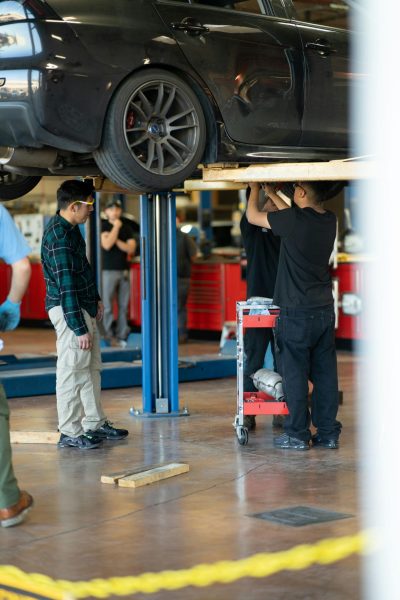
Vehicles must be currently registered and insured, and you must also bring your own parts, fluids or supplies, or have the technicians order parts for the vehicle at a cost. The registered owner must fill out and sign a liability release form, available at the SRJC AutoShop. The auto repair does not include body repairs for collision accidents.
“There is no labor charge, on our end, for the repair,” said SRJC automotive program instructor David Lemmer. “There’s always somebody that works for O’Reilly or AutoZone, and they can get on their hotline and track [any necessary] parts. So we can work with people, but it’s up to the car owner to provide the car parts and materials.”
Lemmer emphasized that although repairs can be done, the fundamental nature of the program is an educational one for students. “We’re here to provide a service to the community as long as it fits structurally with what’s going on.”
For more information on the auto repair services, call (707) 527-4495 or visit the Lounibos Center in-person and talk to an available technician.
Discounted dental cleanings and care
Nestled within the first floor of the William H. Race Health Sciences Building on the Santa Rosa campus is the dental hygiene teaching clinic.
Since its inception in 1999, the SRJC dentistry program has offered dental services including cleanings, x-rays, fluoride applications and sealants for students and non-students alike. Cleanings, X-rays, fluoride applications and sealants are provided, while restorative services like fillings, crowns or dentures are not offered.
“I just wish that there were more students who would take advantage of these services, and I think a lot of it has to do with them not knowing we’re here,” said Jennifer Apocotos-Kirk, the dental clinic’s second-year coordinator.
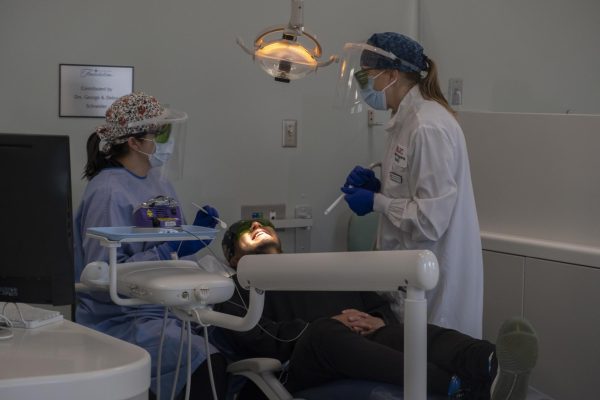
With appointments lasting around three hours due to dental students actively learning and practicing their craft, Apocotos-Kirk acknowledges the difficulty some people may face with scheduling visits. “I understand that it’s really tough to make appointments when students have classes, but if there’s an arrangement that can be made to get the dental hygiene student and the patient’s schedule to align and everybody shows up for appointments, then they can walk away with a good healthy mouth,” she said.
The longer visits may be worth it for those seeking cheaper dental services, since the clinic offers $80 dental cleanings, $50 full-mouth radiographs and more. Apocotos-Kirk added that revenue generated at the clinic funds the dental program itself.
To make an appointment with the clinic, call (707) 522-2844 or visit the reception desk in person. Additional information regarding the dental services can be found at dentalprograms.santarosa.edu.
On-campus childcare
The Robert A. Call Child Development Center on the Santa Rosa Campus allows child development students and faculty to work and train with children, but it also functions as a childcare center, providing subsidized childcare to SRJC students’ infants and toddlers from 6 months to 5 years of age.
These services are selective, however. “Everybody is ranked by their family size and income,” Children’s Center supervisor Tina Rosenberg said. “And any time we have an opening, we are required to start at the top of the list, [with] children that are potentially at risk of abuse or neglect. And then we go by their income.”
She added, “For both [infant and toddler] programs, it is free to anyone whose income is below the 75th percentile over the gross median income level. From the 75th percentile on up, there’s a sliding-fee scale, but the State of California just this year has made it so that the fees can’t be more than 1%. So we went from fees that were sometimes $100 or $200 down to $40 or $50.”
The Children’s Center serves a maximum of 75 children, with the toddler’s program comprising 27 children. Due to staffing shortages, the Children’s Center does not currently serve 75 children, although a hiring process is underway. Rosenberg further explained that the Children’s Center offers care only during fall and spring semesters.
Apart from hoping that childcare services were offered at the Petaluma campus, Rosenberg also wishes for greater access. “Infant and toddler care would be the other place that I would love to see being able to expand,” she said. “Our waitlist for infants is really long, but we have a tiny room for the infants, so we can’t really fit that many in there [because] it’s just not safe for them. So, I would love to see that expanded a little bit as well.”
The Children’s Center is open 8:30 a.m. to 3:15 p.m. Mondays through Thursdays, and from 8:30 a.m. to 12:30 p.m. Fridays. More information is available at childrenscenter.santarosa.edu.
Tech loans
Beyond the abundance of books and quiet places to study, SRJC’s Doyle and Mahoney libraries are overflowing in technology they can provide.
From the typical white board markers and erasers for students in study rooms, the libraries also offer semester-loan laptops and hotspots, phone and laptop chargers, adapters, digital cameras, projectors, light tables, drawing tablets and more.
Regarding laptops, Kat Dietrich, library technician at Santa Rosa’s Doyle library, gave insight into how many SRJC students benefit from them. “I can tell you that this semester, so far we have lent out 461 laptops across both campuses, 390 at Doyle [and] 71 at Mahoney,” she said. “In total, we have 848 laptops currently on [loan] to students.” Dietrich added, mentioning that the total figure includes students who still have laptops from past semesters and have not yet renewed or returned them, but likely still use them.
Genaveve Clendenen, a student worker at Doyle Library, elaborated on some of the libraries’ resources by mentioning that they can also offer headphones, calculators and digital media studio equipment like cameras, green screens and microphones.
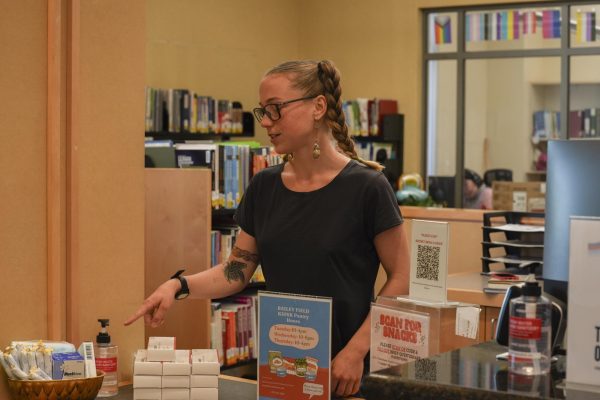
The libraries also invite therapy dogs for weekly campus visits. This semester they were on-site from 11:30 a.m. to 1 p.m. Mondays through Wednesdays at Doyle Library and from 11 a.m. to 12:30 p.m. Tuesdays at Mahoney Library. Their visits are the collaborative result between the libraries and Paws as Loving Support (PALS), a non-profit organization that brings specially trained emotional support dogs to locations across Sonoma County for those who need them.
The culmination of all these services makes Dietrich particularly proud. “On one hand, I am a former teacher and a former public library employee — so I have an idea of what students and library patrons need, and coming here six months ago, I was surprised and delighted by everything we do to serve students,” she said. “That being said, I think students deserve every single thing we can do to make their educational experience more comfortable and fruitful. I’m always on the lookout for student input about their needs.”
Info on library services is available at libraries.santarosa.edu/computers.
Healthcare and homeless resources
SRJC also provides a litany of health-related services free of charge by nurse practitioners, physicians and medical assistants through Student Health Services. They include short-term illness and injury treatments, pregnancy tests, emergency contraception, STI testing and treatment, and pap smear and mammogram referrals.
Health screenings like blood pressure, weight, vision, hearing and tuberculosis tests are also available. Student Health Services can also provide over-the-counter medications like pain relievers, condoms and band aids.
These services are provided on the third floor of Santa Rosa’s Bertolini Student Center and at room 610 of the Richard W. Call Building in Petaluma. More information is available at shs.santarosa.edu.
Resources in the works involve SRJC’s recently hired social workers, who connect students to discounted housing rates, community resources and help with Polly Hall applications, according to Candy Owens, student engagement coordinator for the Petaluma campus and Lily Hunnemeder-Bergfelt, director of reentry and student resources.
Owens explained that work is planned “for students who are either at risk, need units of emergency funding or [are] currently unhoused and looking for resources.” These services may prove to be crucial to students, given an estimated 22% are homeless and 54% are housing insecure, according to SRJC sources.
In addition to housing, Hunnemeder-Bergfelt urged students facing similar food and financial dilemmas to fill out the online basic needs request form in as much detail as possible so that SRJC can provide the best resources needed for students.
The Student Resource Center can then provide students with a personalized basic needs consultation to discuss what resources off and on-campus are available.
These SRJC resources, among others, are not the end-all-be-all for students. However, their continual availability can help make students’ lives more manageable. And maybe, just maybe, they may make you look at SRJC and yourself as a Bear Cub in a new way.




